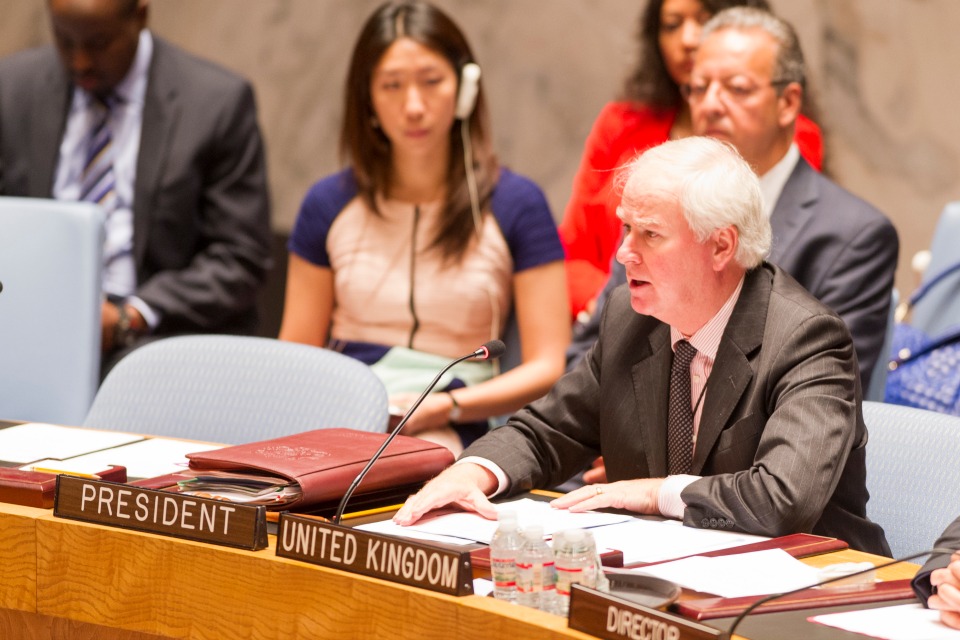'We remain firmly committed to our shared goal of an end to all wars in Africa'
Intervention by Ambassador Lyall Grant of the UK Mission to the UN to the Security Council Open Debate on Peace Operations: the UN-AU partnership and its evolution

I thank you, Mr President, for convening this important debate and for attending it in person today. This is a valuable opportunity to take stock again of one of the United Nation’s most important institutional relationships, namely its partnership with the African Union. I thank also the Secretary-General and President Boyer for their contributions this morning.
Let me start by underlining the United Kingdom’s horror at the Taliban’s cowardly attack on a school in Peshawar which killed so many children. Our deepest condolences go to the families and loved ones of those killed and injured and to the people and government of Pakistan.
Mr President
There have been many shared successes of the UN-AU relationship this year. I would like to highlight four in particular.
First, we have seen close and professional collaboration between AU and UN teams in planning for the transition from an AU to a UN peacekeeping mission in the Central African Republic. The AU mission stabilised the security situation, allowing for a smooth handover to the UN peacekeeping mission in September. This process worked significantly better than the similar transition in Mali last year, reflecting a gradually improving partnership between the organisations.
Second, UN-AU cooperation has led to tangible results on the ground in Somalia this year. AMISOM, an AU mission with UN and European Union logistical and financial support, has reflected some of the best of African peace operations: a robust mandate, courageously delivered, with real success in driving back Al-Shabab. Our shared challenge now is to extend and preserve those gains. In this context, we look forward to the joint UN-AU review of AMISOM next year.
Third, we have seen the positive impact of mutually reinforcing political engagement by the UN, AU and its sub regional organisations. The UN, AU and ECOWAS worked in lockstep in response to the political crisis in Burkina Faso in November. The joint visit by envoys from the three organisations at a pivotal moment showed united support for the transition and likely prevented a slide into further instability.
Fourth, we welcome the AU’s collaboration with the World Health Organisation in deploying healthcare workers to West Africa to tackle the Ebola virus.
It is clear that the UN-AU partnership is at its most effective when we have a shared vision and shared goals; when we build on the lessons learned from the past; when the two organisations work closely together in assessments, planning and operational delivery; and when both bring the appropriate capability and expertise to the task.
Mr President
I would like to pay tribute to the work of the Special Representative of the Secretary-General to the AU, Haile Menkerios, and to the expanded UN Office to the AU. Its members are now working closely with the AU Commission right across the conflict cycle, from early warning and conflict prevention or mediation, to deploying and sustaining missions, to post-conflict reconstruction and development. This work can lead to an even more effective and joined-up approach to situations of developing instability.
Mr President
Looking ahead to 2015, there will be further challenges for the UN and African Union to surmount together. First, the growth of asymmetric threats, non-state protagonists and increasing collaboration by extremist terrorist groups. This demands a united approach from us all. Both the UN and the AU are stepping up activity to counter these threats. We welcome, amongst other things, the African Union’s strong stance against Kidnap for Ransom, and the Nouakchott Process to bring security and intelligence chiefs together in the Sahara and Sahel.
Second, there are opportunities to enhance further the joint UN-AU partnerships in the months ahead. We look forward to the UN review of UNAMID, in collaboration with the African Union. UNAMID is the only hybrid AU-UN peacekeeping operation, and it is not working as it should. Important decisions on UNAMID’s future lie ahead.
Third, 2015 will see several elections in African countries. We welcome the African Union’s long- and short-term monitoring missions. These help to promote sound elections, carried out in respect of African countries’ constitutions and the African Charter on Democracy, Elections and Governance. The African Union must not waiver in its commitment to these standards.